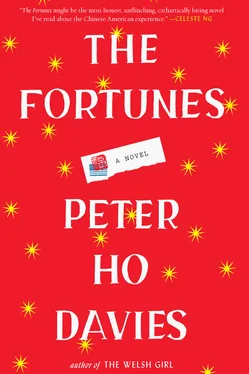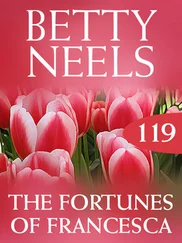The only children Big Uncle kept were his lawful sons by Aunty Bao. Their father styled himself a respectable Chinese comprador — frogged brocade jacket over ankle-length changshan, silk cap smoothed tight over shaven head — grooming his boys to run the family business, even if that business consisted of a brothel, an opium den, a smuggling fleet. Big Uncle’s sons were plump and well dressed — on land they could pass for Cantonese — but more than anything Ling envied them their father’s name. As a small child he would watch them following the big man, listening as he taught them his trade (“Opium and sex belong together; the one enhances the other.” “Or at least prolongs it,” Aunty Bao pouted) and Ling began to trail them in turn, imitating their deference, their attentiveness, until the oldest boy, thinking he mocked them, shoved him to the deck with a thud. Big Uncle had turned at the sound and casually, as if stretching, struck the bully about the head. Ling recalled glimpsing the heavy leather wrist guards of a hatchet man beneath his silk sleeves. “They’re worthless if they’re crippled,” Big Uncle noted calmly over Elder Brother’s sobs, patting Ling’s shoulders and examining him. “How are you?” he asked, and Ling, eyes wide but dry, piped up, “Well… father!” And the man smiled on him from beneath his sleek mustache.
Young Ling had no hope, even as he searched the faces of the white ghosts who frequented the brothel, of finding his own father. The man had given him up, after all. But he still wanted a father, needed one. To be fatherless in China, he understood, was to be poorer than the hungriest peasant.
He had made himself useful about the boat, running errands for the girls, waiting on their customers. His specialty was preparing opium for the men: pinching and rolling the doughy pills between his small fingers, holding them over the lamp on the needle until they began to smoke and bubble, then deftly depositing them in the bowl of the waiting pipe. Over time, squatting at their feet, he began to pick up shreds of their language — English mostly, but also phrases of Portuguese and French, Italian and Spanish — to go along with his Cantonese. It got to be a performance, men calling him “little parrot” and tipping him in coin (from which Aunty Bao took her customary cut). Once he saw Big Uncle watching him, and a few days later the man gave him a gift, a pet cricket folded up in a tiny cage made from a carved bamboo cylinder. He cherished it, peering in at it though the narrow bars, falling asleep to its ringing song, like a prayer or a promise. He wept when it fell silent, hiding for days, thinking he’d be beaten for letting it die (though Big Uncle never asked about it again).
Aunty Bao must have seen his hopes in his face. When he grew taller, she insisted he leave—“He’ll fall in love with one of the girls, lah! Bad for business!”—and so Big Uncle sent him on his way, though not to Peru or Cuba but to “Big City,” San Francisco. He already sold girls from his nursery to supply the brothels on Gold Mountain. The boy with his pocketful of English might do well there too, he reasoned.
“Off to your own kind,” Aunty Bao crowed, but Ling, despite his misgivings, went willingly enough, eager to prove himself a dutiful son. “Your passage is paid,” Big Uncle told him, “a position arranged.” Ling had bowed, promised to send money, and the old gangster nodded complacently. That was when he’d told him gold was in his blood. Ling was fourteen years old. He knew nothing of America, nothing of mining — pictured himself drawing gold from the dirt like the apothecary straining over that old grandfather, yanking the gold from its roots, brandishing a nugget in a pair of pliers, wet and a little bloody — but he vowed to strike it rich and return in triumph. (His ideas of gold were to be even more confused when, on the voyage out, the captain had lowered the dory to recover an odd floating rock, as it seemed, the color of pale tea. Ambergris! the crew exulted. Floating gold! Though later Ling was to learn it was whale puke.)
Outside the carriage window, the trees — sharp firs poking through their layered foliage like the spike impaling receipts on Crocker’s desk — fell away as the train ascended a ridge and the view opened before him. The distant peaks shone in the morning light, not gold, of course, but brilliant white, and as they climbed he watched the flakes tumbling past the window, mixed with sparks and smut from the smokestack.
Snow, and it was June.
The flurry whipped and twisted like a swarm, so blithely nimble, even as he felt the train grow taut, girding against gravity. And then an updraft swooped in and sent it spiraling back into the sky.
Beneath the thunderous thrill of it all — Ling was used to accompanying Crocker about town, but never before into the field — lay a thrum of unease. He contemplated the idle men waiting at the end of the line, the striking Chinese, and wondered why Mister Charley had brought him along.
3.
He’d been with Crocker for a little over two years by then, since 1865. His first job off the paddle steamer in Yee Fow — Second City, as the Chinese knew Sacramento — had been at a laundry on I Street, one of the shanties backing onto China Slough, hauling boiling kettles from the stove to the great half-barrel tubs where his boss, Uncle Ng, a wiry Cantonese, sat smoking and working the soaking linens between his red callused feet, every so often tapping the ash from his pipe—“soo- dah! ” as he pronounced it — into the suds like so much seasoning.
Ng wore a wispy beard and a sleepy mien, heavy-lidded, his head seemingly propped on the long-stemmed pipe clamped between his teeth, but he had a dark mole the size of a pea above the bridge of his nose, a third eye that seemed to squint whenever he furrowed his brow. His queue he coiled around his head to keep out of the laundry water (at first glance, vision bleary from lye, Ling had been scandalized to think Ng had cut his hair, imperial law requiring the queue as a mark of fealty), but he let a single strand sprouting from his mole grow long and silky, believing after the Chinese tradition, if against all experience, that it brought him luck.
Ng was an inveterate gambler, tucking his coins into his ears for safekeeping and absenting himself each evening and part of most days to play the lottery or dominoes or “precious dice,” whatever he could find. He’d bet on which starling would rise off a roof first, back one cockroach over another in a race, so long as there was someone to wager against. He would return invariably with tales of perspicacious wins and unforeseeable reverses, but it seemed to Ling as if they mostly evened out, which might have been the extent of Ng’s luck.
Not surprisingly, he was an indulgent boss, often leaving Ling unsupervised as if he were a partner, not an employee. Even when he was present during the day he was often stretched out, snoring, on an ironing platform, catching up on sleep from the night before. Ling took him for a fool — easy to see why he’d never amounted to more than a laundryman — but the old man’s neglect was mostly benign. Early on, with a sly show of solemnity, he confided his “mystery”—a few crumbs of blue from an ink block added to the rinse water to make the “white whiter”—but otherwise he offered little direction beyond a couple of quick stabs with his pipe stem, once at the wall of tightly wrapped parcels stacked like bricks, then at the heap of plump, sagging bundles tied up in sheets, their knotted corners twitching in the breeze like ears. “These clean, those dirty. You…” The pipe stem swung from one to the other. But when he found Ling a few days after he started with his hands blistered from washing, he clucked over them, dressed the wounds himself. “Why. You. Think. I. Use. My. Feet?” he asked, punctuating each word with a tacky dab of salve.
Читать дальше












